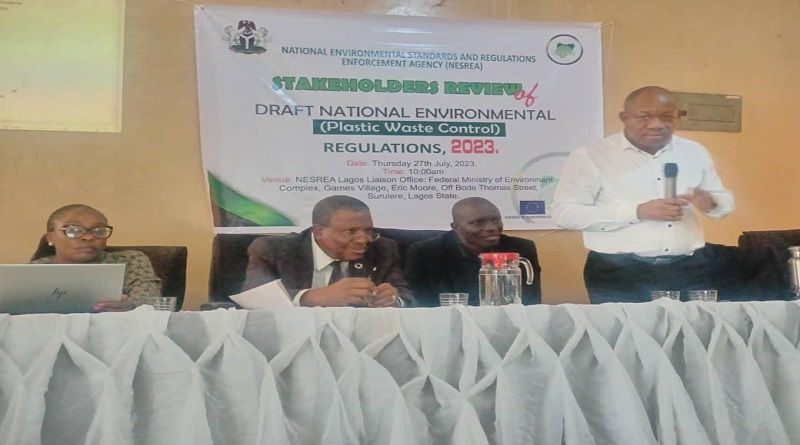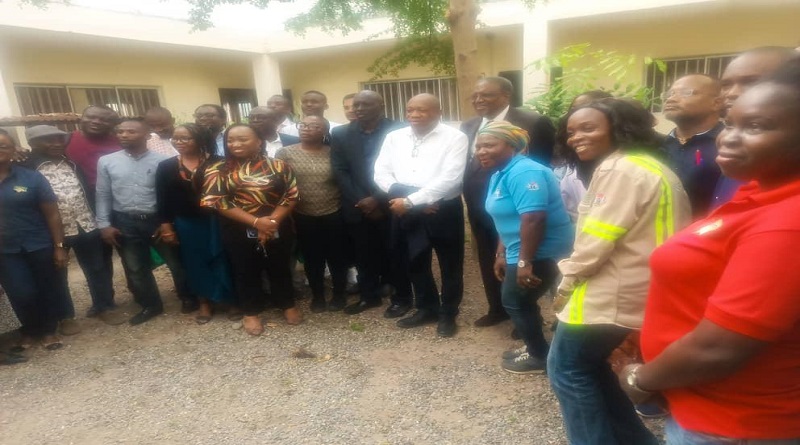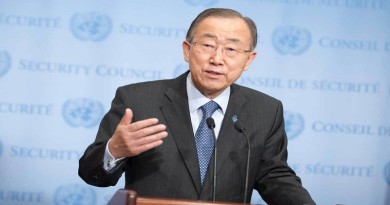Stakeholders plead for more engagement as NESREA, SRADev present draft plastic waste control regulation
Efforts to ban the use of plastics in Nigeria received a boost at the weekend as stakeholders gathered in Lagos on Thursday 27th July 2023 for the review of the Draft National Environmental (Plastic Waste Control) Regulation, 2023.
The stakeholders, who gathered at the Lagos Office of National Environmental Standards and Regulations Enforcement Agency (NESREA), comprised plastic manufacturers, waste recyclers, regulators, and government’s representative from the National Agency for Food and Drug Administration and Control (NAFDAC, Nigerian Maritime Administration and Safety Agency (NIMASA) and Lagos State Waste Management Authority (LAWMA), among others.
The stakeholders, while expressing their views during the review of the draft plastic waste control regulation, pleaded for more engagement, collaboration and time to sort out identified grey areas before the final draft of the law.
In his welcome remarks, Director- General of NESREA, Prof. Aliyu Jauro, while appreciating the stakeholders particularly the European Union (sponsors of the exercise) and the Lead Consultant, SRADev Nigeria led by Adogame, said the main objective of the regulations was to provide measures for the control and minimisation of pollution from the operations and ancillary activities in the plastic sector in Nigeria’s environment.
Besides, he said it was aimed at adopting sustainable and environment friendly practices in plastic and waste management to minimise pollution in the country.
Participants in a group photograph at the Draft National Environmental (Plastic Waste Control) Regulation, 2023 review workshop held in Lagos on Thursday 27th July 2023.
Justifying the essence of the stakeholders’ forum, Dr. Leslie Adogame, Executive Director of Sustainable Research and Action for Environmental Development (SRADev) and National Consultant to NESREA, European Union Projects on Plastic Waste Control Development, said that the process of developing a regulation especially for a sector like plastic waste was very important.
He said EU is supporting Nigeria in the project because of concerns regarding plastic waste, noting that many countries have move ahead to regulate this while Nigeria is lagging behind.
Adogame explained that his team has succeeded in putting in place an enforceable and implementable regulations, “We’ve delivered a zero draft for stakeholders to dialogue,” he said.
According to him, the gathering was meant to get stakeholders’ views on the proposed regulation, saying that the process to manage and regulate plastic would require that one interfaces with all the key stakeholders in the plastic ecosystem.
He said: “Issue of plastic waste cut across different sectors: social, economic, environmental, public health and political issues. So it’s important that stakeholders’ views from the grassroot at both the local and state levels are incorporated before you can finalise the new law.
“After this, we move into the technical review, where the document will be given a technical depth; after that validation,” the lead consultant said.
Distinguished Professor and chairman of the occasion, Babajide Alo, said the essence of the meeting was to start carrying along Nigeria’s citizens and producers of plastics on the need to be conscious of the plan of the Federal Government to put out regulations against plastics, particularly single used plastic in the economy.
According to him, it meant that government was trying to stop undue spread of plastics waste in the environment.
“This is because, as you go around the city, you find plastics waste all over- plastic containers and pure water wrappers littering the whole environment.
“The intention of the draft law is to try to stop it. Before now, there was no regulations but now, government is coming with regulations,” he said.
Some of the stakeholders, especially plastic manufacturers, raised concern about their huge investment in the plastic manufacturing equipment, urging government to take that into cognizance before the ban.
In her remark, Executive Secretary of the Food and Beverage Recycling Alliance, Agharese Onaghise, said her members needed time to properly understudy the provisions of the draft regulations.
According to her, there was need for extensive engagement of the relevant stakeholders on the different sections, appealing for the phased implementation of the regulations.
Others stakeholders also called for more education and enlightenment so that people would have better understanding of the proposed regulation.
Some expressed concern that sudden ban on plastics would result to a total colossal loss on the part of manufacturers, who have invested much on equipment.
They said there was a need for the committee to put individuals’ investment into consideration.
The draft document on plastic waste control regulation is divided into seven parts: Part one has to do with objective and applications, while part two comprises general provisions ranging from the registration with PRO and State Environmental Protection Agencies; prohibition of non-biodegradable garbage in public drains and sewage system; responsibility of individuals and premises owners; provision for the placement of receptacles; duty of owners and occupiers; responsibility of the owner of premises; best practices; pollution control organisation system; monitoring discharge of effluents.
Part three deals with institutional roles and responsibilities; part four contains plastic waste control; part five comprises enforcement, part six – offence and penalties; part seven – approved intervention programme, while part 8 deals with definitions or interpretations.





